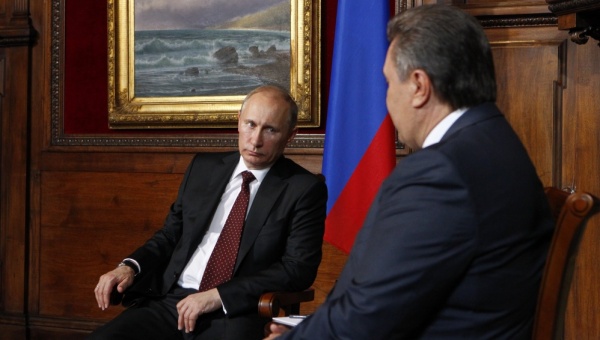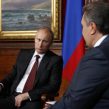
Russia Ready to Give the Falling Ukraine a Push—and Might Follow Suit
Publication: Eurasia Daily Monitor Volume: 11 Issue: 35
By:

The long telephone conversation between United States President Barack Obama and Russian President Vladimir Putin in the earliest hours of last Saturday was remarkable in its surrealistic detachment from the real events in Ukraine, which were the main topic of the exchange. Obama sought to ensure Russia’s involvement in the “quick implementation” of the agreement reached in Kyiv last Friday between then-president Viktor Yanukovych and the leaders of the opposition under the mediation of foreign ministers of France, Germany and Poland (https://ria.ru/world/20140222/996361904.html). Putin emphasized the importance of working with the radical opposition, which in his opinion had driven the confrontation in Ukraine to a dangerous stage (https://president.kremlin.ru/news/20308). Both leaders probably knew that the agreement could not be implemented, because Yanukovych had to flee from mutinous Kyiv as they spoke and could not possibly deliver on his part of the deal, while the victorious Maidan protest movement would not accept any diplomatic compromises.
Obama and Putin may publicly agree that the key task is to prevent Ukraine’s break-up, but they cannot fail to see that it has stopped functioning as a state in any meaningful sense except through having internationally recognized borders. Obama may blame himself—and even more the European Union member states and bureaucracy—for not paying sufficient attention to this crisis as it turned into a catastrophe (https://slon.ru/world/evropa_po_doroge_v_novyy_belfast-1060101.xhtml). Putin is more inclined to blame the malicious West for sponsoring a rebellion against legitimate authorities, while in fact, he carries the main responsibility for delivering Ukraine beyond the brink of state failure (https://polit.ru/article/2014/02/21/neutrality/). Indeed, it was his resolute decision to prevent Yanukovych from signing an association agreement with the EU—a far from fateful document—that triggered the first wave of protests in Kyiv last November. It was also his attempt—influenced by fears stirred by those protests—to resolve the issue by granting Yanukovych far more financial aid than anybody thought possible that propelled the escalation. Even when dozens of people died in shootouts in Maidan last Thursday (February 20), Prime Minister Dmitry Medvedev encouraged Yanukovych to show more vigor in asserting his legitimacy (https://ej.ru/?a=note&id=24502).
This policy, based on the assumption that Ukraine was for sale, is now in shambles, and the triumphalism underpinned by the confidence that the EU would never contemplate a bid matching Putin’s $15 billion has evaporated leaving the chronic fear of mass uprisings. The anxiety in the Kremlin is mixed with irritation over the spoiled show of the Sochi Olympics—the Games were supposed to demonstrate Russia’s affluence and dynamism. Instead, the poor performance of the hockey “dream team” left millions of fans bitterly disappointed, and the ugly attack of pseudo-Cossacks on the female punk rock band Pussy Riot’s daring performance revealed the aggressiveness of the officially cultivated “patriotism” (https://slon.ru/world/kak_sochi_nakrylos_pussi-1059926.xhtml). The long-planned political dividend from investing astronomical sums into converting the dilapidated Sochi into a glitzy one-off capital of winter sports has failed to materialize, and the Games are set to be forever associated with the bloodshed in Kyiv.
From this unpromising point of departure, the Kremlin now has to move fast with policymaking in two crucial directions. The first one goes toward the Ukraine in distress, and the spectacular return of Yulia Tymoshenko onto the political arena, which gives Putin a peer he respects and can do business with (https://lenta.ru/articles/2014/02/22/free/). This stance, however, inadvertently implies that he acknowledges not only the blunder of supporting Yanukovych but also the fiasco of the attempt to prevent Ukraine from moving closer to Europe. Admitting mistakes is a bane for any politician, and Putin absolutely loathes allowing for such a possibility.
As for Tymoshenko, in order to take firm control over the unruly Maidan she has to do more than just secure tangible support from the disconcerted EU. She needs to make a clean break with the pattern of clan-based and deeply corrupt policy-cooking she used to be very much a part of (https://echo.msk.ru/programs/code/1263672-echo/). Putin would not want that pattern to be swept away by the revolution and he might instead prefer to work with risky options of breaking Ukraine apart. In the Russian elites, ideas on appropriating bits and pieces of collapsing Ukraine, focusing particularly on Crimea, have been entertained since the explosion of the crisis last November (Nezavisimaya Gazeta, February 20; https://www.gazeta.ru/politics/2014/02/19_a_5917225.shtml). The official line still remains for preserving Ukraine’s territorial integrity, but the ground is well prepared for a swift turn of this course. It is only the timely disbursement of credits from Russia that postpones the sovereign default in Ukraine, and Putin has few reasons to continue with this generosity (RBC Daily, February 21).
The second avenue of decision-making goes through Russia, and the impact of the Ukrainian revolution on the domestic situation is difficult to evaluate. Still, Putin is inclined to believe in the worst possible spill-over (https://echo.msk.ru/blog/nemtsov_boris/1264336-echo/). In order to minimize this “contamination,” he might find it necessary to demonstrate that nothing good comes out of the riot executed by Western-sponsored extremists against legitimate authorities—and that bodes ill for the stabilization of tumultuous Ukraine. His nervous courtiers might also try to unleash a new round of repressions against the liberal opposition—particularly now that the order for Russia to be on its best behavior for the Sochi Olympics has expired (Novaya Gazeta, February 22). In the last week, Putin has quietly executed a series of purges among the security services personnel (siloviki), seeking to reinvigorate their loyalty (Moskovsky Komsomolets, February 22).
The failure to stop Ukraine’s “Orange Revolution” in late 2004 was one of the gravest and personally painful mistakes of Putin’s leadership, he believes, and now it is reproduced with much greater emphasis and destructive power. A decade ago, Putin was still able to learn from mistakes and chart a careful course of damage minimization. But the probability of inadequate reactions is significantly higher now that Putin has developed such a tall opinion of himself while presiding over a stagnating economy (see EDM, October 7, 2013), disconcerted elites, and a society in which only 10 percent believe that the country is on track for stable development (https://www.levada.ru/18-02-2014/situatsiya-v-rossii-otsenki-i-ozhidaniya). The temptation to bring down revolution-infected Ukraine is no longer checked by worries about responses coming from the incapacitated West; and partaking in a counter-revolutionary dismemberment of the closest of neighbors will deny Russia a chance for a peaceful post-Putin transition.




